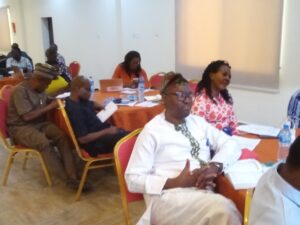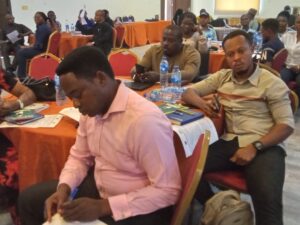
Nigeria, the most populous country in Africa, has witnessed significant progress in its democratic processes since its return to civilian rule in 1999. However, one critical challenge that continues to plague the nation’s electoral system is the issue of trust. The Independent National Electoral Commission (INEC) plays a pivotal role in ensuring free, fair, and credible elections, but several stakeholders have raised concerns about the erosion of trust and its consequences for democracy and development. Abdulrahman Aliagan writes on One-Day Roundtable discussion with journalists and Civil Society Organizations (CSOs) on the role of election stakeholders in rebuilding trust in the electoral process and institutions.
The International Press Centre (IPC) Lagos-Nigeria, a leading Media Development and Press Freedom Organization, recently held a roundtable to address the role of stakeholders in rebuilding trust in the electoral processes and institutions. The roundtable discussion, titled “Re-examining the Role of Critical stakeholders in Rebuilding Trust in The Electoral Processes and Institutions,” took place in Abuja.
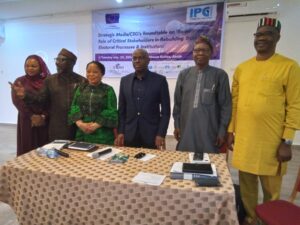
Member of the High-Table include: Mr. Lanre Arogundade, the Executive Director of IPC, highlighted the need for stakeholders to work individually and collectively to regain public trust and confidence in the Nigeria electoral system. He emphasized that this was especially important as two off-cycle governorship elections are scheduled for 2024 and the next general elections will take place in 2027. This round-table was deemed necessary to develop strategic interventions that can contribute to the delivery of free, fair, peaceful, and credible elections in Nigeria.
This Media/CSOs roundtable is part of IPC’s efforts within the European Union Support to Democratic Governance in Nigeria-Phase 2 project, specifically focusing on supporting the media to promote democratic governance through fair, accurate, ethical, and inclusive coverage of electoral processes and elections in Nigeria.
Mr. Arogundade acknowledged that the 2023 general elections faced unexpected challenges, leading to a decline in public confidence and trust in the electoral process. He referenced the European Union Election Observation Mission’s report, which made recommendations for improvement. IPC’s media monitoring also revealed negative perceptions and varying opinions about the electoral processes and outcomes.
Dr. Akin Akingbolu, the Executive Director of the Centre for Media and Society, commended IPC for organizing the roundtable and expressed optimism about its potential to strengthen institutions. He emphasized the need to address old problems and prepare for new challenges that may arise.
Prof. Okechukwu Ibeanu, an Election Administration Expert, stressed the importance of trust in all activities, including elections. He highlighted three dimensions of trust: belief in the promissory value of the ballot, the content value of the ballot, and the psychological value of the ballot. He also outlined key points about trust in the electoral process, emphasizing the impact of general trust deficit and the role of technology in rebuilding trust.

Mr. Lanre Arogundade, the Executive Director of International Press Centre (IPC), Dr. Akin Akingbolu, the Executive Director of the Centre for Media and Society,
Prof. Okechukwu Ibeanu, an Election Administration Expert, Mr. Jide Ojo, a Development Consultant and Public Affairs Analyst and Mrs. Mary Nkem, the Director of Voter Education and Publicity, INEC at the Roundtable Discussion in Abuja.
Mr. Jide Ojo, a Development Consultant and Public Affairs Analyst, delivered a presentation on the role of critical stakeholders in rebuilding trust in the electoral process and institutions. He called for the involvement of CSOs and the Media in rebuilding trust in the Independent National Electoral Commission (INEC). Mr. Ojo expressed concern about the lack of public information regarding the arrests, investigations, and prosecution of INEC staff involved in compromising the integrity of the election. He also urged the National Assembly to ensure certainty of law for all states, protecting the interests of voters.
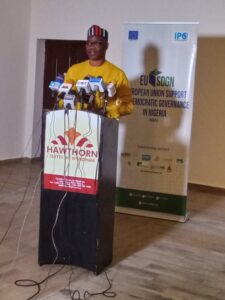
Mr. Jide Ojo, a Development Consultant and Public Affairs Analyst is doing justice to the topic of the discussion at the event.
Mrs. Mary Nkem, the Director of Voter Education and Publicity at INEC, highlighted the Commission’s open-door policy and commitment to including stakeholders in policy decisions. She clarified that INEC does not have the power to arrest and investigate but shared that the electoral body had received 19 case files, with three successfully concluded.
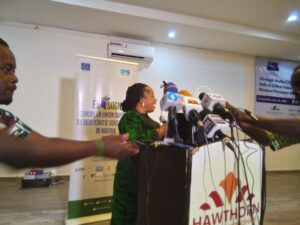
Mrs. Mary Nkem, the Director of Voter Education and Publicity at INEC, explaining the Commission readiness to work with stakeholders in order to improve on the existing gains at the Commission.
Journalists and CSOs actively engaged in the discussion, raising critical concerns related to trust in the electoral system. These included the accessibility of the electoral process to persons with disabilities, political party accountability, the uploading of results to INEC servers, and unreported election expenditures.
During the discussion, Mr. Francis Abayomi, a journalist, raised a critical question on the issue of accessibility for Persons with Disabilities. He urged INEC to consider implementing facilities and gadgets that would allow for an all-inclusive election in Nigeria.
Other issues raised during the discussion included the accountability of political parties, INEC’s delay in uploading of results to their server, and the issue of political corruption and unreported election expenditures.
INEC as the electoral management body responsible for organizing and overseeing elections in Nigeria, the Commission shoulders the enormous responsibility of ensuring the credibility of the democratic process. Its mandate encompasses several crucial tasks, including voter registration, political party registration, conducting elections, and announcing election results. However, a series of past electoral irregularities has raised doubts and undermined trust in the commission’s ability to execute its mandate impartially and effectively.
Meanwhile, efforts to rebuild trust necessitate a collective commitment from all election stakeholders, most notably INEC. Stakeholders, such as journalists and CSOs, serve as the watchdogs of democracy, providing a critical check on electoral processes, while INEC holds the primary responsibility for ensuring transparency, fairness, and credibility.
Restoring trust in Nigeria’s electoral system is a complex and multifaceted endeavor that requires unwavering dedication from all election stakeholders, including INEC. It is crucial to address the various dimensions of trust deficits, ranging from transparency to accessibility and accountability. As the nation looks ahead to the 2027 general elections, it is imperative to embark on proactive measures that rebuild trust, ensuring the strengthening of democracy and development in Nigeria.
Just as IPC has identifies the needs and it has also been taken the lead in building media capabilities for democracy and development as it was evident in her organization of the Roundtable discussion and its efforts to address the challenges and rebuild trust in Nigeria’s electoral system, through initiatives like these, IPC aims to contribute to the improvement of democracy and development in the country. It has been consistently focusing on finding solutions to improve elections and regain trust in the process in Nigeria.




